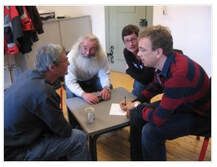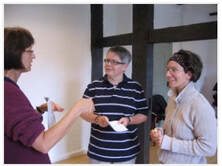S-Pronunciation
S-Pronunciation | Englischlernen online
"Die Ausspracheregeln für Englisch können aufgrund der vielen Ausnahmen und Variationen recht komplex sein, aber hier ist eine allgemeine Anleitung für die Laute, die mit 's', 'ss', 'c', 'see' und ähnlichen Lauten zusammenhängen:"
- "s" am Wort- und Silbenanfang: Es klingt normalerweise wie /s/ wie in "sun" (Sonne), "say" (sagen) und "single" (einzeln). Dieser Laut ist stimmlos, das bedeutet, man benutzt die Stimmbänder nicht, um ihn zu erzeugen.
- "s" zwischen Vokalen: Es behält oft den /s/-Laut bei, wie in "museum" (Museum) oder "rosy" (rosig), kann aber manchmal zu einem stimmhaften /z/-Laut werden, wie in "nose" (Nase) oder "music" (Musik).
- "ss": Typischerweise ist "ss" ein klarer /s/-Laut, stärker und betonter als ein einzelnes "s". Beispiele sind "class" (Klasse), "grass" (Gras) und "miss" (verpassen).
- "c" vor "e", "i" oder "y": Es klingt normalerweise wie /s/ wie in "cent" (Cent), "city" (Stadt) und "cycle" (Zyklus).
- "c" vor "a", "o", "u" oder Konsonanten: In diesen Fällen klingt "c" typischerweise wie /k/ wie in "cat" (Katze), "cot" (Kinderbett), "cute" (süß) und "clap" (klatschen).
- "see" und ähnliche "ee"-Endungen: Der "ee"-Laut ist ein langes /i:/ wie in "see" (sehen), "tree" (Baum) oder "free" (frei). Es ist eine längere, mehr gedehnte Version des /i/-Lautes in Wörtern wie "bit" (Bisschen).
- "sc": Wenn es von "e", "i" oder "y" gefolgt wird, klingt es oft wie /s/ wie in "science" (Wissenschaft) oder "scene" (Szene). Andernfalls klingt es wie /sk/ wie in "scale" (Skala) oder "school" (Schule).
"s" am Wort- und Silbenanfang:
"s" am Wort- und Silbenanfang:
- "s" am Wort- und Silbenanfang:
- Sunny days are nice.
- Silly songs are fun.
- Sally likes to sing.
- Snakes are long
- She is clever.
- Sparrows are loud.
- Smoke is smelly.
- Stables are for horses.
- "s" zwischen Vokalen:
- The museum is big.
- The flower is rosy.
- His nose is small.
- "ss":
- I go to class.
- I see the grass.
- I don't want to miss.
- "c" vor "e", "i" oder "y":
- It costs one cent.
- The city is busy.
- I ride my bike.
- "c" vor "a", "o", "u" oder Konsonanten:
- The cat is cute.
- The cot is small.
- The cup is full.
- "see" und ähnliche "ee"-Endungen:
- I can see you.
- The tree is tall.
- It's free for you.
- "sc":
- I like science.
- We play on the school.
- The scale is big.
- "s" am Wort- und Silbenanfang:
- She loves to soak up the warm rays of the sun on the beach.
- He always has something interesting to say during our conversations.
- The teacher asked the students to find a partner for the single experiment.
- "s" zwischen Vokalen:
- The art lovers explored the exhibits at the local museum.
- Her cheeks turned rosy when she received compliments on her artwork.
- She wrinkled her nose at the strange smell coming from the kitchen.
- "ss":
- The students gathered in the classroom for their first lesson.
- The children ran barefoot through the green grass of the park.
- She didn't want to miss the opportunity to see her favourite band perform live.
- "c" vor "e", "i" oder "y":
- The store offered a cent discount on all items for students.
- He dreamed of living in a busy city full of opportunities.
- She enjoys riding her bicycle along the scenic cycle paths.
- "c" vor "a", "o", "u" oder Konsonanten:
- The cat chased the mouse around the garden.
- She sat on the cot (Kinderbett) and read a bedtime story to her child.
- The baby's laugh was incredibly cute (niedlich).
- "see" und ähnliche "ee"-Endungen:
- She loves to sit by the window and see the birds in the garden.
- The children climbed the tree to pick ripe apples.
- They offered a free trial of their new software for a limited time.
- "sc":
- He studied science to understand the mysteries of the universe.
- The actors rehearsed the final scene of the play.
- She measured the length of the fish using a scale.



